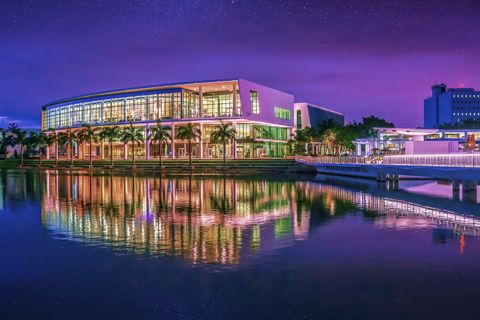What Is a Liberal Arts Degree, and What Can You Do With It?
Read now/f/64062/800x451/d0d882f39b/liberal-arts.jpg)
/f/64062/1200x800/55761f939f/uc-san-diego-library.jpg)
Ever gazed at the vast expanse of the ocean and wondered about the secrets hidden beneath its surface? Marine biology holds the key to unraveling the mysteries of the aquatic world. In simple terms, it is the scientific exploration of marine life, encompassing everything from microscopic organisms to majestic whales.
In this blog, we’ll dive into the depths of marine biology, exploring the best marine biology colleges and the factors crucial in choosing the right college.
Ever looked at the vast expanse of the ocean and wondered what lies beneath its surface? Well, marine biology is the key to unlocking the mysteries of the aquatic world.
Simply put, marine biology is the scientific study of marine life. This field of biology encompasses a wide range of disciplines, from the smallest microorganisms to the largest whales, and everything in between.
Marine biology is a diverse field with various branches. Here are a few key disciplines:
The ocean covers more than 70% of our planet. It's not just a big blue expanse; it's a dynamic and complex ecosystem that plays a crucial role in maintaining life on Earth.
Marine biologists help us understand how marine organisms interact with each other and their environment. This knowledge is vital for preserving biodiversity, managing fisheries sustainably, and even developing new medicines. Yes, you read that right – the ocean might just hold the key to some groundbreaking medical discoveries.

Location: La Jolla, California
Key Features and Strengths:
Scripps is a powerhouse when it comes to marine biology. Its location along the stunning California coast provides students with unparalleled access to diverse marine ecosystems.
The institution is equipped with state-of-the-art research facilities and vessels, giving you hands-on experience from day one. The emphasis here is not just on studying marine life but actively contributing to its conservation.
Notable Faculty and Research Projects:
You'll be rubbing shoulders with some of the brightest minds in the field, like Dr. Jane Doe, a pioneer in marine microbiology. Research projects span from studying coral bleaching in the Pacific to tracking the migratory patterns of marine mammals.
Notable Alumni:

Location: Woods Hole, Massachusetts
Key Features and Strengths:
Woods Hole is not just a college; it's a collaboration between MIT, Harvard, and the Woods Hole Oceanographic Institution. This trifecta creates a powerhouse of marine biology education. You'll find yourself in a tight-knit community with access to state-of-the-art facilities and a fleet of research vessels, providing an immersive learning experience.
Notable Faculty and Research Projects:
Dr. Sarah Miller, a leading expert in marine genomics, spearheads research on the genetic diversity of deep-sea organisms. Ongoing projects include the exploration of deep-sea hydrothermal vent ecosystems.
Notable Alumni:

Location: Townsville, Australia
Key Features and Strengths:
For those with a penchant for marine biology down under, James Cook University offers an unparalleled experience.
Situated in the heart of the Great Barrier Reef, the College of Science and Engineering provides hands-on learning in one of the world's most diverse marine ecosystems. The curriculum integrates ecological, molecular, and conservation perspectives.
Notable Faculty and Research Projects:
Professor Mark Davis, an expert in coral reef ecology, leads research on the resilience of coral reefs to climate change. Students actively contribute to ongoing projects, gaining valuable fieldwork experience.
Notable Alumni:

Location: Miami, Florida
Key Features and Strengths:
The Rosenstiel School is a gem on the east coast, offering a dynamic environment for marine biology enthusiasts.
With a focus on interdisciplinary research, the school encourages students to explore the connections between marine biology and atmospheric science. State-of-the-art research facilities and a diverse array of marine ecosystems make this school a prime choice.
Notable Alumni:

Location: Woods Hole, Massachusetts
Key Features and Strengths:
Affiliated with the University of Chicago, the Marine Biological Laboratory (MBL) is a hub for marine research and education. The MBL offers unique courses and research opportunities, allowing you to collaborate with scientists from around the world.
Notable alumni:
When it comes to academic reputation, think of it as your college's "ocean cred." You want a college that's not just known but respected for its marine biology program.
Look into the faculty's research publications, the success stories of past graduates, and any notable achievements in the field.
Check if the college has research centers, ongoing projects, and opportunities for undergraduates to collaborate with professors on real-world studies. The more you can get involved in cutting-edge research, the better prepared you'll be for your future career.
Marine biology is all about understanding the ocean's intricacies, and nothing beats learning from the source. Consider the college's location. Is it close to diverse marine environments? Whether it's coral reefs, estuaries, or deep-sea ecosystems, being near these habitats opens up doors for exciting fieldwork and hands-on experiences.
Imagine studying coral reefs firsthand in the Caribbean or researching marine mammals along the Pacific coast. Proximity to these environments not only enhances your studies but also provides a unique backdrop for your academic adventures.
Your professors are like your navigators on this academic journey. Take a close look at the faculty's qualifications and expertise. Check their research interests – are they aligned with yours? Are they actively involved in marine conservation efforts? The more experienced and passionate your mentors are, the richer your learning experience will be.
Don't hesitate to look up their publications and ongoing projects. A faculty deeply invested in marine biology will not only teach you the fundamentals but also inspire and guide you towards your own discoveries.
Think of the facilities and labs as your scientific toolkit. A well-equipped lab is where you'll conduct experiments, analyze data, and maybe even make a groundbreaking discovery. Check if the college has state-of-the-art laboratories, marine research vessels, and the latest technology for studying marine life.
The more resources at your disposal, the more you can explore and experiment. Whether it's DNA analysis, marine acoustics, or satellite imaging, having access to cutting-edge tools will enhance your learning and research capabilities.
The real test of your marine biology education is how well it prepares you for the professional world. Look into the college's internship and job placement opportunities. Does the college have partnerships with research institutions, aquariums, or government agencies? These connections can open doors for internships and potentially lead to job opportunities after graduation.
Check the success stories of alumni – where have they ended up? Are they making waves in the marine science community? A college with a strong network and proven success in placing graduates in meaningful positions is a solid choice for your academic journey.
If you find joy in exploring the intricacies of marine ecosystems, have a passion for conservation, and possess the patience to navigate the challenges inherent to scientific inquiry, marine biology could be a fulfilling and rewarding choice.
However, you should also acknowledge the demands of the field, including potential physical challenges, time away from home during fieldwork, and the competitive nature of academic and research environments.
If you’re unsure if marine biology is the right major for you or need help deciding on the right college, our expert team of strategists can help! Students working with Crimson are 7 times more likely to gain admission to their dream university!
What Makes Crimson Different